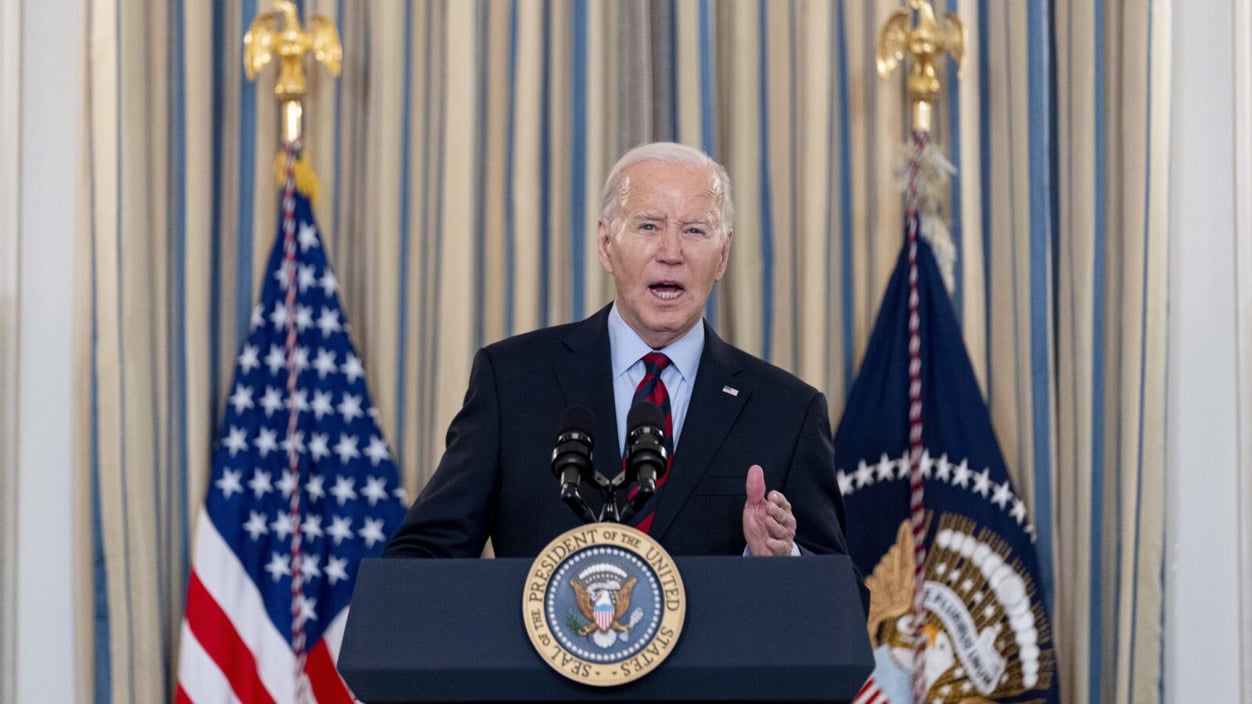white house
Biden: Bigger is better on drug pricing

ANDREW HARNIK/AP
President Biden will tonight confirm pharmaceutical manufacturers' worst fear about Democrats' new Medicare drug price negotiation program: that its creation would be a slippery slope toward deeper cuts.
In his address tonight, Biden will suggest expanding four of the drug pricing reforms that got watered down in negotiations over the law (within the Democratic party, we might add). He will propose increasing the number of drugs Medicare can negotiate every year from the eventual 20-drug threshold to 50, and extending to patients with commercial insurance a $35 monthly cap on insulin, a $2,000 annual cap on drug costs, and penalties for drug price hikes. Get the full rundown here.
Many of the guests Democratic lawmakers are bringing are also related to health care. Sen. Patty Murray (D-Wash.) is bringing a woman who traveled to Washington from Idaho to get an abortion, Sen. Tim Kaine (D-Va.) is bringing the first person in the United States to be born via in-vitro fertilization, Sen. Tina Smith (D-Minn.) is bringing a director of an abortion clinic that moved to Minnesota from North Dakota, and House Minority Leader Hakeem Jeffries (D-N.Y.) is bringing Mini Timmaraju, President and CEO of Reproductive Freedom for All. Sen. Raphael Warnock (D-Ga.) is bringing a former ER nurse who's in Georgia's Medicaid coverage gap.
courtroom watch
Pharma's four attempts to score in court
Today is a big day for the pharmaceutical industry's campaign to challenge Medicare's new drug price negotiation program. The effort has hit some early setbacks — federal judges threw out PhRMA's case (which the group is appealing) and ruled against AstraZeneca — but a remarkable quadruple-header oral arguments in New Jersey today will offer a true test of the industry's main arguments.
As I was reading through the four cases brought by Bristol Myers Squibb, Johnson and Johnson, Novartis, and Novo Nordisk, that last one stood out. Novo Nordisk has a compelling argument that its insulin products may not have been chosen for the program if Medicare officials had interpreted the law differently, which could be a substantive test for regulatory challenges to the law, not just constitutional ones.
And, as a bonus, my favorite analogy in the complaints goes to Novartis, which argue that it's unreasonable to ask drug makers to leave Medicare to avoid negotiation: "'Let them leave Medicare' is essentially the same '[l]et them sell wine [instead of raisins]' argument the government urged, and the Supreme Court rejected…."
I'll be reporting on the arguments, so stay tuned — and if you subscribe to STAT, you can turn on email alerts for my stories so it will be delivered right to your inbox immediately!
capitol hill
Senate ignores biotech concerns on China bill
A Senate committee yesterday passed a bipartisan bill aimed at preventing certain Chinese companies from doing business in the United States, much to the angst of U.S. biotechs.
Sen. Rand Paul (R-Ky.) was the sole homeland security committee member to vote against the bill. The Kentucky Republican worries that lawmakers are using anger against China as cover for parochial interests. He also said the committee hasn't researched the potential impact of the bill on the U.S. biotech industry.
The U.S. industry's main gripe is that the bill targets WuXi Apptec, a company that U.S. companies rely on for many services. The author of the House version of the bill said he is not as worried about WuXi as other companies named in the bill. However, the author of the Senate bill, homeland security Chair Gary Peters (D-Wis.) declined to say whether some companies are more of a concern than others.
In the House, lawmakers heard Wednesday from Maj. Gen. Paul Friedrichs, director of the White House Office of Pandemic Preparedness and Response Policy, in his first testimony before the coronavirus subcommittee since Biden formed the office in July 2021. Much like other hearings before this panel, government missteps and lessons learned from Covid-19 messaging dominated the hour-and-a-half hearing. Friedrichs also said the office would have a report this year on its work since founding. Republicans, in particular, seem interested in the report and questioned whether the White House is the best place for a permanent pandemic prep office.


No comments